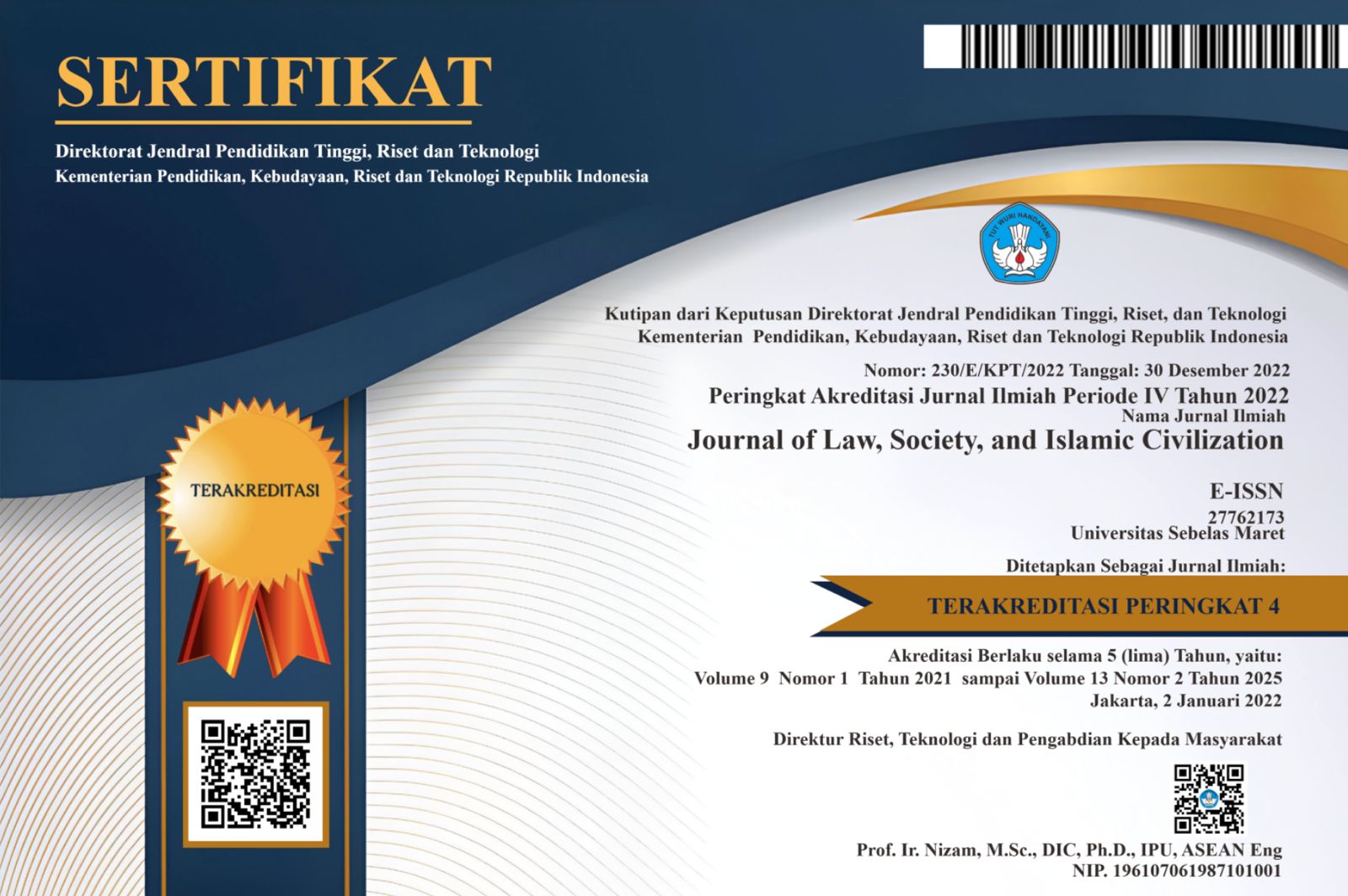Restorative Justice for Corruptors in Indonesia; Why and How?
Abstract
Keywords
Full Text:
PDFReferences
Abbas, K. (2021). Corruption Crime Eradication by Corruption Eradication Commission Through Red-handed Catch Operation on Bribery Action. Jurnal Bina Praja, 13(2), 319-329.
Benuf, K., & Azhar, M. (2020). Metodologi penelitian hukum sebagai instrumen mengurai permasalahan hukum kontemporer. Gema Keadilan, 7(1), 20-33.
Bowers, J. (2021). What if nothing works? On crime licenses, recidivism, and quality of life. Virginia Law Review, 107(5), 959-1058.
Braithwaite, J. (2020). Restorative justice and Reintegrative Shaming. In Criminal Justice Theory, Volume 26, Routledge, 281–308.
Felisiano, I., & Paripurna, A. (2023). Penerapan keadilan restoratif dan celah praktik korupsi. Integritas: Jurnal Antikorupsi, 9(1), 135-145.
Firdaus, M., Dwilaksana, C., & Onielda, M. D. A. (2023). Shifting Polri's Law Enforcement Strategy: Restorative Justice for Public Trust. Jurnal Media Hukum, 30(2), 153-170.
Garcia, V., Disemadi, H. S., & Arief, B. N. (2020). The enforcement of restorative justice in Indonesia criminal law. Legality: Jurnal Ilmiah Hukum, 28(1), 22-35.
Herring, Jonathan. 2021. Criminal Law: The Basics. Routledge.
Honig, Bonnie. 2023. Political Theory and The Displacement of Politics. Cornell University Press.
Kasim, A., Rimi, A. M., & Purnamasari, A. I. (2023). Restorative justice to prevent village fund corruption crimes: A constitutional law and Indonesian criminal law perspective. International Journal of Criminal Justice Sciences, 18(1), 97-112.
Kirkwood, S. (2022). A Practice Framework for Restorative Justice. Aggression and Violent Behavior 63: 101688.
Lewis, C. (2020). The Paradox of Recidivism. Emory LJ 70: 1209.
Loeffler, C. E., & Nagin, D. S. (2022). The impact of incarceration on recidivism. Annual review of criminology, 5(1), 133-152.
Madjid, A., & Istsiqomah, M. (2023). Restorative Justice: A Suitable Response to Environmental Crime in Indonesia?. Krytyka Prawa 15(3), 86–100.
Madjid, M. A. S. W. (2022). Politics of Law of Limitation of The President’s Prerogative in the Formation of Ministries Based on The State Ministry Law. Constitution Journal 1(2), 169–88.
Nurhayati, Y., Ifrani, I., & Said, M. Y. (2021). Metodologi normatif dan empiris dalam perspektif ilmu hukum. Jurnal Penegakan Hukum Indonesia, 2(1), 1-20.
Olson, J., Sarver, R. S., & Killian, B. (2023). Seeing the harm to happiness: Integrating satisfaction with life into restorative practices. Criminal Justice Policy Review, 34(1), 88-109.
Pangaribuan, A. P. (2023). Pertimbangan Hakim Dalam Memutus Penyertaan (Deelneming) Pada Tindak Pidana Pembunuhan Berencana. UNJA Journal of Legal Studies, 1(3), 170-189.
Prabowo, A. S., Triputra, A. N., Junaidi, Y., & Purwoleksono, D. E. (2020). Politik Hukum Omnibus Law di Indonesia. Jurnal Pamator: Jurnal Ilmiah Universitas Trunojoyo, 13(1), 1-6.
Pratiwi, S. (2022). Delik Penyertaan Dalam Kitab Undang-Undang Hukum Pidana (KUHP). Binamulia Hukum, 11(1), 69-80.
Rochaeti, N., Prasetyo, M. H., & Park, J. H. (2023). Implementing of Restorative Justice to Build the Criminal Justice System in Indonesia: A Study of the Batak Toba Justice System. Law Reform, 19(2), 221-247.
Sulistiani, L, & Fakhriah, E. L. (2023). The Effect of Extra Judicial Settlement in Criminal Cases Based on the Principle of Ultimum Remedium. Padjadjaran Jurnal Ilmu Hukum 10(3), 300–320.
Vooren, M., Rud, I., Cornelisz, I., Van Klaveren, C., Groot, W., & Maassen van den Brink, H. (2023). The effects of a restorative justice programme (Halt) on educational outcomes and recidivism of young people. Journal of experimental criminology, 19(3), 691-711.Refbacks
- There are currently no refbacks.












